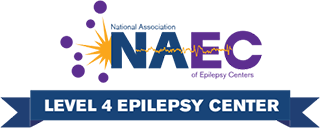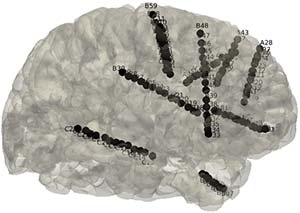The Pediatric Epilepsy and Pediatric Epilepsy Surgery Program

The Children's Hospital of Michigan is recognized by the National Association of Epilepsy Centers (NAEC) as a Level 4 epilepsy center. Level 4 epilepsy centers have the professional expertise and facilities to provide the highest-level medical and surgical
evaluation and treatment for patients with complex epilepsy. At the Children’s Hospital of Michigan, renowned clinicians and researchers on the medical staff in Neurology and Neurosurgery provide
advanced resources and treatment to diagnose and treat children with pediatric epilepsy. The pediatric epilepsy experts on staff have significant experience using surgical treatments for patients with infantile spasms, tuberous sclerosis
complex and Sturge-Weber syndrome. Pediatric specialists including epileptologists and neurosurgeons on the medical staff at the Children's Hospital of Michigan have treated patients with these conditions referred from within and outside the country.
What is Epilepsy?
Epileptic seizures occur when the electrical signals in the brain misfire, a temporary communication problem between nerve cells. A child who has repeated seizures is said to have epilepsy. Epilepsy or seizure disorders affect about
one percent of all children between the ages of 0 and 17.
Diagnostics to Pinpoint Seizure Activity
Pediatric neurologists and neurosurgeons on the medical staff
at the Children’s Hospital of Michigan evaluate patients with chronic uncontrollable seizures. Advanced imaging technology is vital for accurate diagnosis and precise treatment of pediatric neurological diseases. Advanced imaging technologies
include video-EEG recording, high-resolution MRI and PET scanning including a 3.0 Tesla scanner, which enable epilepsy experts to determine the source of the patient's seizures and their potential cause. Electromyography (EMG), and Nerve Conduction
Velocity (NCV) testing is also available.
Stereoelectroencephalography (SEEG)
 The Neurology and Neurosurgery Division at the Children's Hospital of Michigan offers an advanced technology called stereo-electroencephalography (SEEG).
This diagnostic method is also known as stereo-EEG, and used to identify the source of a child's seizures in their brain. A child may be recommended for SEEG when their seizures don't respond to medicines or other treatments, and other tests suggest
that the seizures are coming from a single area of the brain.
The Neurology and Neurosurgery Division at the Children's Hospital of Michigan offers an advanced technology called stereo-electroencephalography (SEEG).
This diagnostic method is also known as stereo-EEG, and used to identify the source of a child's seizures in their brain. A child may be recommended for SEEG when their seizures don't respond to medicines or other treatments, and other tests suggest
that the seizures are coming from a single area of the brain.
Brain Mapping
The ultimate goal of brain surgery is to provide a cure without a patient experiencing functional deficits. The Hospital’s Neurodiagnostics Lab offers brain mapping tools that enable pediatric neurosurgeons to pinpoint or map the focus of seizure
activity within the brain so that they may perform brain surgery on small patients with great precision. Neuropsychological testing is also used to help clarify the behavioral and cognitive issues related to a child’s epilepsy.
Children’s Hospital of Michigan offers specialized brain-mapping software program. Where this technology once provided two- or three-dimensional images, it now offers four-dimensional brain mapping and image of the brain, animating neural activation
every 0.01 seconds. This brain mapping technology allows the surgeon to visualize “where” and “when” functionally important brain structures work, and to more precisely localize the seizure focus.
Approximately, 90 percent of patients with seizure focus in functionally unimportant areas of the brain benefit from surgical removal of the seizure focus. About 80 percent of these patients become seizure free. For patients with seizure focus
in a functionally important area, the pediatric neurological doctors on staff will discuss with the family and patient the pros and cons of conservative and aggressive treatment options, always considering the best interest of the patient and
family. A variety of surgical treatment options are available based upon the patient's specific diagnosis.
Treatment
Treatment options generally include drug therapy. Approximately 20 to 34 percent of those affected may continue to have uncontrolled seizures, despite being on two or more appropriate seizure medications. In some cases where drug therapy
is unsuccessful, Children’s Hospital of Michigan uses several treatment modalities such as the
ketogenic diet,
corpous callostotomy,
vagus nerve stimulator (VNS) implant, hemispherectomy,
focal cortical resection, and
multiple subpial transections.
Children with medically uncontrolled seizures can be evaluated and considered for the Epilepsy Surgery Program at the Children’s Hospital of Michigan.
The Epilepsy Surgery Program at the Children’s Hospital of Michigan exists to serve children with difficult to manage or uncontrollable seizures. Since its inception in 1994, more than 1,000 pediatric patients from Michigan and throughout the world
have benefitted from the highly specialized diagnostic and treatment techniques used at the Children’s Hospital of Michigan, nationally ranked by U.S. News and World Report and Parent Magazine as one of America’s best hospital for
children and recognized for quality and safety by the Leapfrog Group.
Using PET scanning, neurologists pinpoint the origin of epileptic seizures so that neurosurgeons can remove affected tissue in the brain. This procedure often improves
the patient’s condition dramatically, with success rates in the 80 to 90-percent range.
The division of Neurology and Neurosurgery at the Children’s Hospital of Michigan are internationally recognized for the expertise and the medical staff, advanced neurosurgery capabilities, minimally invasive neurosurgery options and remarkable
patient outcomes.
Get further information on surgical treatment options
Research
Physicians on the medical staff at the Children’s Hospital of Michigan have been involved in groundbreaking epilepsy research – including National Institutes of Health and National Institutes of Neurological Disorders and Stroke funded projects.
For further information or to schedule an appointment call (313) 745-KIDS or toll-free at (888) 362-2500.




 The Neurology and Neurosurgery Division at the Children's Hospital of Michigan offers an advanced technology called
The Neurology and Neurosurgery Division at the Children's Hospital of Michigan offers an advanced technology called 